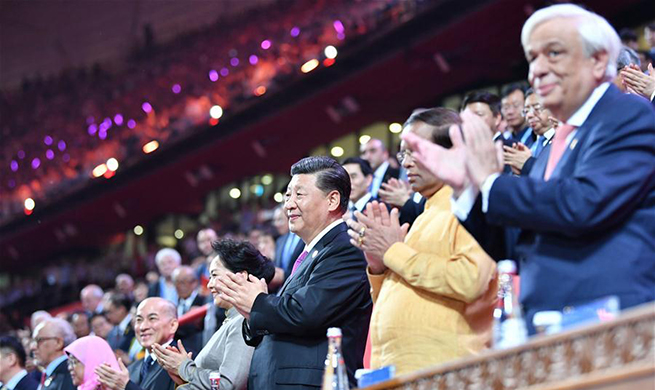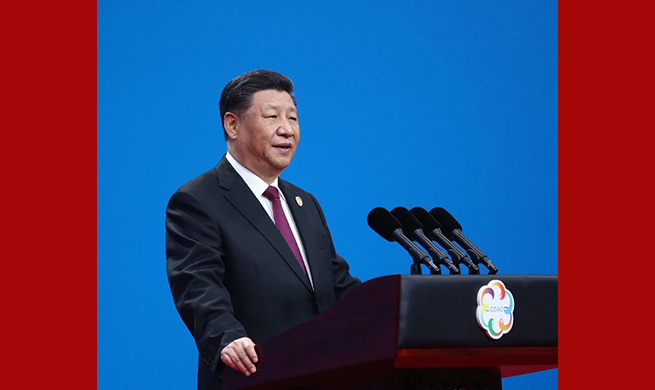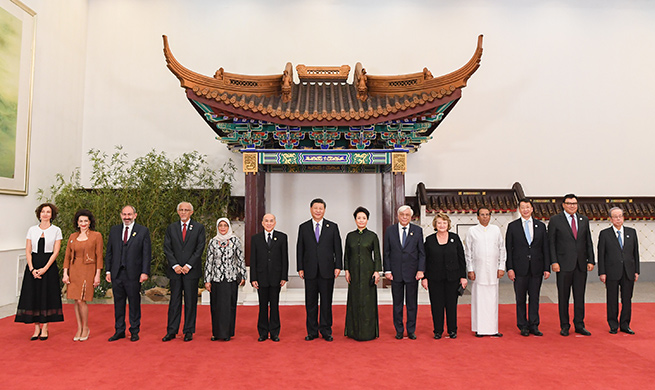HARBIN, May 16 (Xinhua) -- Major soybean growers in China are expanding to achieve fast growth in domestic supply of high-quality soybean produce this year while cutting the country's dependence on imports.
The seeding for soybeans is going on in north China's Heilongjiang and Jilin provinces, Inner Mongolia Autonomous Region, and the central province of Henan, with an estimated planting expansion rate of over 10 percent this year.
China's soybean imports declined for the first time in seven years, according to the China Agricultural Sector Development Report 2019 released on Monday. The import volume was 88.03 million tonnes last year, down by 7.9 percent year on year.
Soybean futures at the Chicago Board of Trade closed Monday at the lowest level in more than 10 years, as traders showed increasing concerns about the escalating trade friction between the United States and China.
China announced Monday that it would raise the rate of additional tariffs imposed on some of the imported U.S. products from June 1. This decision came after the U.S. move to increase tariffs on 200 billion dollars worth of Chinese goods from 10 percent to 25 percent as of May 10.
FARMERS' ENTHUSIASM
In Heilongjiang Province, which yields half of China's soybean output, farmer Fu Zhengwu is planting soybean seeds provided by the Northeast Institute of Geography and Agroecology, affiliated to the Chinese Academy of Sciences.
Fu said he planted 267 hectares of the soybean breed last year, which contains high-protein levels.
Li Yanhua, a researcher of the institute, said the new soybean breeds such as Dongsheng No. 7 and No. 17 were developed by the institute last year. They have become hotly sought after, as some farmers tasted the sweet harvest last year.
The provincial department of agriculture and rural affairs estimated that the soybean planting area would increase by over 10 percent this year, from last year's 3.6 million hectares. Large cooperatives manage many soybean plantation fields in the province for mechanic farming.
Neighboring Inner Mongolia has planned to add 133,333 hectares of soybean plantation area this year, bringing the total to 1.2 million hectares. With the popularity of drip irrigation, the average soybean yield in the arid region reached 4,366.5 kg per hectare in 2018, up from a record high of 3,765 kg per hectare set in 2005.
In eastern China's Shandong Province, the provincial academy of Agricultural Sciences has also been involved in breeding new soybean varieties with advantages of anti-water-logging and resistance to cotton bollworm, factors that deter farmers from cultivating soybeans.
"The new breed can ensure a stable yield of 3,000 kg per hectare, which has aroused farmers' interests in soybean production," said Yang Wujie, an official from the provincial department of agriculture and rural affairs.
In eastern China's Jiangsu Province, farmers will plant soybeans after harvesting wheat around the end of May.
Cai Weiquan, a rural cooperative manager in Huai'an City, said farmers have high expectations about the future value of soybeans in the market. The cooperative will satisfy the growing soybean demand this year.
Zhao Jinming, deputy head of the National Soybean Improvement Center, said Jiangsu has been a national pilot in interplanting soybean and wheat, promoting the technology of no-tillage mechanization of wheat stubble to improve farming efficiency.
HEALTHY CHOICES
Soybean food has been a long time dominance on the Chinese dinner table with a variety of traditional flavors such as soybean milk, beancurd jelly, soybean oil and dried beancurd.
Soybean's rich plant-based protein and fat have become more and more favored by China's increasing number of healthy diet lovers, which has given impetus for food suppliers to develop innovative products.
A recent online promotion of soy ice cream sold more than 9 million units in six months in the country.
"We have eyed a large number of Chinese consumers that are lactose intolerant, which prevents them from eating ice cream," said Zhang Dekun, general manager of the Heihe Kunpeng Biotechnology Co. Ltd. in Heilongjiang, which produces the ice cream.
The business has benefitted from a patent technology developed by Gai Junyi, a member of the Chinese Academy of Engineering Sciences, who helped the soybean planting province to research the replacement of animal protein with soybean protein in ice cream while retaining the sweet and delicate mouthfeel.
Several other health food options have been developed and even became hot-selling exports. Soybean noodles and spaghetti products developed by Heihe Agricultural Health Food Co. Ltd. in Heilongjiang have been sold to Germany and have seen growing popularity in the domestic market.
Led by the soaring market demand for soybean food, farmers have learned to sign with food suppliers for contractual farming.
"Some of our soybean planting is planned based on orders from food companies, which ensure the purchased price of soybeans before we plant them," said Cui Xiangmin, a rural cooperative manager in Sunwu County, Heilongjiang.
He said the contractual farming protects farmers' enthusiasm in planting and pushes them to improve the quality of the produce.
There are 36 grain processing companies with a combined capacity to process 1 million tonnes of soybean in Heilongjiang, ensuring that farmers can sell their produce.
"With all the efforts, we need to make substantial progress in developing good seeds so we can properly handle the market instability and put ourselves in a better position in the global market," said Li with the Northeast Institute of Geography and Agroecology.

















